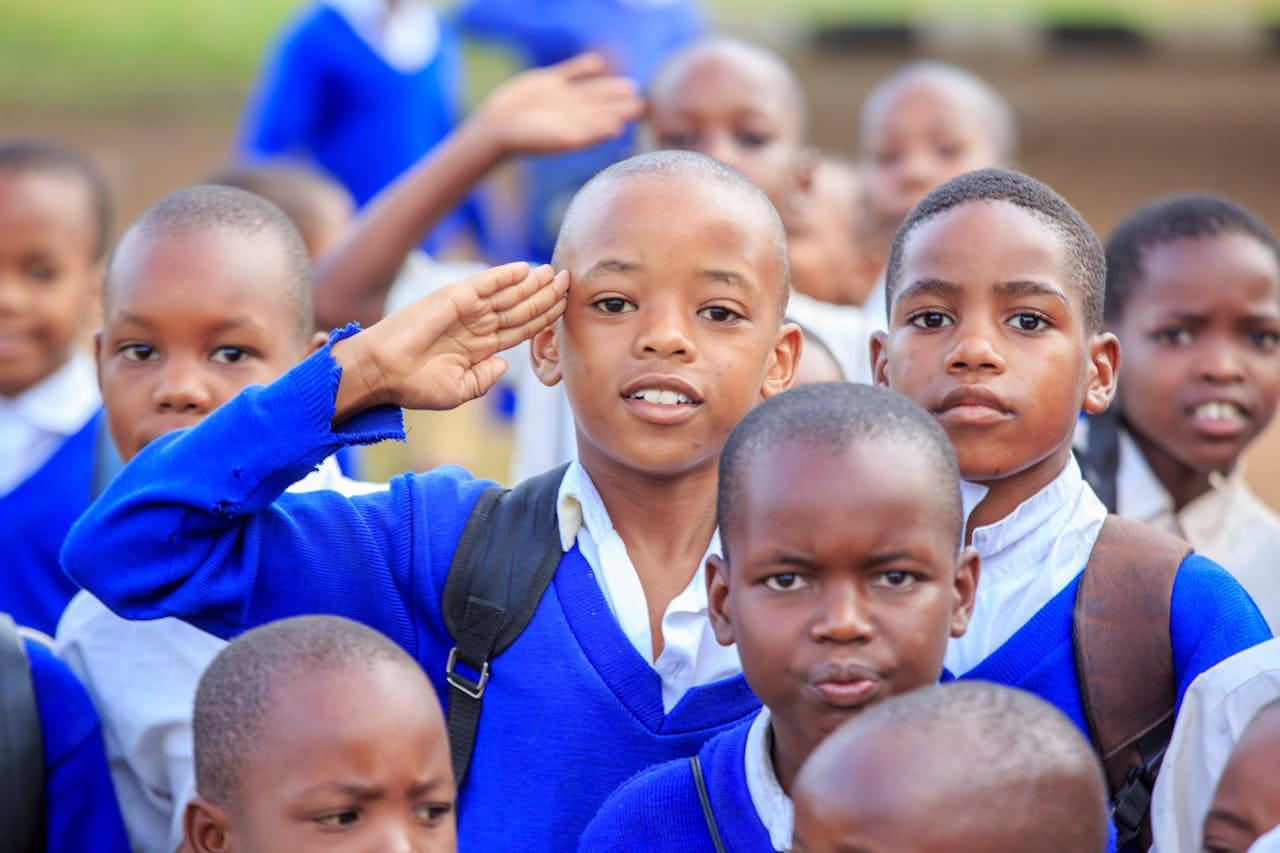On church, food & jobs
As a busy week in education comes to a close, recently hired interns are about to be upgraded in a big way. Heavy rains in the region resulted in some school closures in Tanzania and an innovative Kenyan company received global recognition for making a big difference to the lives of millions of students.
Here are the main stories in education this week:
- TSC in trouble over intern hires
- MP's question PS on eCitizen school fees presidential directive
- More resources for Special Needs Education
SPOTLIGHT
Church & state not seeing eye to eye

A week ago, President William Ruto met with the Kenya Conference of Catholic Bishops (KCCB). The meeting came a day after KCCB issued a statement titled ‘Cry of the Oppressed’ lamenting the “gradual intent to undermine the role of the church as a stakeholder in society”.
The relationship between church and state in Kenya is complex. The 2010 Constitution of Kenya states that there is no state religion and that the church and state are separate. In reality, it’s quite evident that the church has been an authoritative figure in Kenyan politics since independence in 1963.
The Catholic Church operates a vast network of educational establishments, including 5,821 primary schools, 1,756 secondary schools, 2,513 early childhood development institutions, 220 vocational institutions, and 21 teacher training colleges. Collectively, these institutions account for a significant portion of the national educational framework.
In their statement, KCCB listed several issues for the government to address including corruption, over-taxation and others. However, on Education, they took issue with two bills: the Basic Education Bill 2024 and the Universities (Amendment) Bill, 2024.
They said the Basic Education Bill 2024 seeks to dilute and reduce the role of the church in educational institutions by wrestling the management and role of churches in the schools.
The Universities (Amendment) Bill, 2024, they said, grants the Education Cabinet Secretary unilateral power of dissolution and merger of private universities without reference to their owners.
KCCB raised what can be seen to be valid concerns based on long existing structures. Nonetheless, it waits to be seen whether, or to what extent, the government will address their current concerns. It also offers another opportunity for us to check the nature and extent of the relationship between church and state.
HEADLINES
- TSC in trouble over intern hires: The approximately 60,000 educators hired by the Teachers Service Commission on internships may compel their employer to provide them with full salary for their tenure. This development surfaced following a ruling by the Employment and Labour Relations Court (ELRC) which concluded that the commission violated their right to equitable labor practices by assigning them intern roles despite their qualifications and possession of teaching licenses.
- MP's question PS on eCitizen school fees presidential directive: MPs want to know how efficient the system will be so that schools don't have to wait long to access funds to meet their daily needs. They also want the government to address the issue of internet connectivity in most schools, especially those in rural areas.
- More resources for Special Needs Education: 6,000 teachers will be deployed to Special Needs Education (SNE) centres in a bid to address biting shortage. A section of the teachers were initially attached to SNE before moving to regular schools where career progression is almost guaranteed. Currently, there are 300 primary schools and 38 secondary schools catering for learners with special needs and disabilities.
INSIGHT
Salute to partnerships for school meal programs

The largest locally-led and independently run school feeding program in Africa, Food for Education (F4E) was in the news this week after their founder, Ms. Wawira Njiru, received the Social Innovator Award by the Skoll Foundation in Oxford, England. The award acknowledges the outstanding impact of F4E's blueprint model and efforts to mainstream school feeding programs ensuring that no child has to learn on an empty stomach.
F4E designs and operates a scalable system to feed children at schools and invest in local farmers and parents in the process. Developed in Kenya, the F4E model uses centralized kitchens, technology, and smart supply chains to deliver hot, nutritious, and affordable meals to nearly 300,000 school children daily.
The significance of these programs cannot be overstated. Just this week, in Rwanda, school feeding programs were among key issues raised by MP’s as they discussed education quality. Meanwhile in Uganda, opposition asked the government to implement a school feeding program in all schools to improve the quality of education for learners.
In Kenya, the national school meal program set up in 2009 serves more than 1.5 million children in rural drought-affected counties and in 2023, F4E partnered with Nairobi City county to prepare and distribute meals to schoolchildren through a program called Dishi na County. Through this partnership in Nairobi County, F4E have delivered over 12 million meals.
There’s a growing need for more innovative solutions using localized approaches that improve the quality of learning for children. It is encouraging to see the great strides F4E has been able to make since 2012. This is an area where further collaboration between the public and private sectors can contribute greatly to the entire continent's development.
NEWS
What else is brewing?
- First Lady Rachel Ruto has asked women professionals from Nyanza to invest in helping the boys and girls from poor backgrounds in the region to access better education to improve their lot. She encouraged them to draw inspiration from the late Tom Mboya's efforts in combating poverty, particularly through the initiation of the airlift program in the 1960s.
- NTSA on Thursday released guidelines on how motorists can book appointments for vehicle inspection as it encouraged schools to present their vehicles ahead of the May 1 deadline. They revealed that several schools had already heeded the directive and presented their buses for inspection.
- The Centre for Mathematics, Science, and Technology Education in Africa (CEMASTEA) has provided training to Junior Secondary School teachers to enhance their ability to effectively implement the Competency Based Curriculum. The training has been designed to address teaching and learning gaps observed in Junior Secondary in terms of the interpretation of the CBC designs for grade 8 and implementation to realise learner-centred pedagogies.
- Kenya Secondary School Sports Association (KSSSA) director, Nelson Sifuna, said they are working to change the school games set up into an Olympic-kind of championship. "This means all activities will be combined and competed within a term,” Sifuna stated. "The Ministry of Education is committed to supporting sporting activities in the country," he noted.
One-liners
- Machogu taken to task over fate of Edu-Afya
- How education sector can ride on AI for enhanced learning
- Performing arts to be compulsory in CBC, Machogu reveals
- Kenya Directs International Students to Pay Pupils Pass in Dollars Instead of Shillings
- MKU pitches new online Master of Law programme to lawyers
REGION
What's happening next door?
[UG] Opposition advocates for a school feeding policy: Shadow minister for education and Kalungu MP, Joseph Ssewungu, said the lack of sustainable school feeding and nutrition for pupils, teachers and school workers is a major factor affecting the desired education outcomes in Uganda. [Read]
[UG] Govt erred in phasing out nursing course, stakeholders say: Practicing medical personnel have cast doubt on the rationale behind phasing out the comprehensive nursing course instead of enhancing it to boost healthcare provision and quality. [Read]
[TZ] Floods ravage Mbeya, Katavi, leaving trail of destruction: In a precautionary measures to ensure students safety, schools in Mbeya city were forced to close their doors after mudslides swept down from Mount Kawetele. [Read]
[TZ] Poor loan recovery methods costing HESLB billions: The Controller & Auditor General (CAG) notes that by June 30, 2023, the Higher Education Students’ Loans Board (HESLB) had collected Sh1.29 trillion only (62 percent of all matured loans) since the 2006/07 fiscal year. [Read]
[RW] Quality education progress: 5 key issues raised by MPs: Key initiatives highlighted included the expansion of classrooms, school feeding programmes, connectivity enhancement, curriculum reforms, increased access to educational resources such as books and laptops, and improved access to clean water. [Read]
[RW] Students return to school for last term of 2023/24 academic year: School resumed for the third term on Monday, April 15, with boarding students returning to their schools in a phased approach from April 15 to 18. It is anticipated that the national examinations will commence on July 8 until 10 for primary schools, while general and technical secondary examinations will start on July 24 and August 3, respectively. [Read]
EXTRA
The future of education
In this recent article titled "How we can prepare for the future with foundational policy ideas for AI in education" the World Economic Forum proposed 5 key policy ideas to integrate AI in education effectively. With the increasingly rapid developments in AI, the education sector plays a key role in preparing today's students for the future.
If you found this edition useful, share it with someone who might benefit from it as we continue to develop the newsletter. Enjoy the end of your week.
